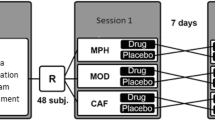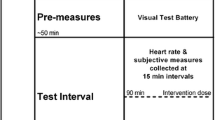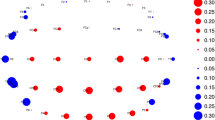Abstract
The effects of caffeine and diazepam on several mood, cognitive, learning, memory, and psychomotor tasks were investigated in a double-blind study of 108 young healthy adults who were randomly assigned to nine treatments; oral administration of caffeine (0, 3 and 6 mg/kg), diazepam (0, 0.15, and 0.30 mg/kg) and their combinations. Subjects completed a battery of tasks once before and twice after administration of the drugs. Caffeine alone showed no effects on cognitive, learning, and memory performance, but impaired fine motor coordination and increased anxiety and tenseness. Diazepam alone produced sedation, lowered other ratings of subjective moods, and impaired cognitive, learning, and memory performance. The two drugs did not antagonize the effects of each other, except in the symbol cancellation task.
Similar content being viewed by others
References
Baker WJ, Theologus GC (1972) Effects of caffeine on visual monitoring. J Appl Psychol 56:422–427
Brezinova V (1974) Effect of caffeine on sleep: EEG study in the late middle age people. Br J Clin Pharmacol 1:203–208
Cattell RB (1930) The effects of alcohol and caffeine on intelligent and associate performance. Br J Med Psychol 10:20–33
Cheney RH (1935) Comparative effect of caffeine per se and a caffeine beverage (coffee) upon the reaction time in normal young adults. J Pharmacol Exp Ther 53:304–313
Cheney RH (1936) Reaction time behavior after caffeine and coffee consumption. J Exp Psychol 19:357–369
File SE, Bond AJ, Lister RG (1982) Interaction between effects of caffeine and lorazepam in performance tests and self-ratings. J Clin Psychopharmacol 2:102–106
Ghoneim MM, Hinrichs JV, Mewaldt SP (1984a) Dose-response analysis of the behavioral effects of diazepam: I. Learning and memory. Psychopharmacology 82:291–295
Ghoneim MM, Mewaldt SP, Hinrichs JV (1984b) Dose-response analysis of the behavioral effects of diazepam: II. Psychomotor performance, cognition and mood. Psychopharmacology 82:296–300
Gilliland AR, Nelson D (1939) The effects of coffee in certain mental and physiological functions. J Gen Psychol 21:339–348
Goldstein A, Warren R, Kaizer S (1965) Psychomotor effects of caffeine in man. I. Individual differences in sensitivity to caffeine-induced wakefulness. J Pharmacol Exp Ther 149:156–159
Harvey DHP, Marsh RW (1978) The effects of decaffeinated coffee versus whole coffee on hyperactive children. Dev Med Child Neurol 20:81–86
Hauty GT, Payne RB (1985) Mitigation of work decrement. J Exp Psychol 49(1):60–67
Hawk PB (1929) A study of the physiological and psychological reactions of the human organism to coffee drinking. Am J Physiol 90:380–381
Henauer SA, Hollister LE, Gillespie HK, Moore F (1983) Theophylline antagonizes diazepam-induced psychomotor impairment. Eur J Clin Pharmacol 25:743–747
Hinrichs JV, Ghoneim MM, Mewaldt SP (1984) Diazepam and memory: Retrograde facilitation produced by interference reduction. Psychopharmacology 84:158–162
Hinrichs JV, Mewaldt SP, Ghoneim MM, Berie JL (1982) Diazepam and learning: Assessment of acquisition deficits. Pharmacol Biochem Behav 17:165–170
Hintzman DL (1966) Tables of random letters. Psychonom Sci 5:253–254
Hull CL (1935) The influence of caffeine and other factors on certain phenomena of rote learning. J Gen Psychol 13:249–274
Johanson CE, Uhlenhuth CE (1980) Drug preference and mood in humans: d-Amphetamine. Psychopharmacolog 71:275–279
Johnson CL, Chernik DA (1982) Sedative-hypnotics and human performance. Psychopharmacology 76:101–113
Karacan I, Thornby JI, Anch AM, Booth GH, Williams RL, Salis PJ (1976) Dose-related sleep disturbances induced by coffee and caffeine. Clin Pharmacol Ther 20:682–689
Kihlman BA (1977) Caffeine and chromosomes. Elsevier Scientific Publishing Company: New York
Kleinknecht RA, Donaldson D (1975) A review of the effects of diazepam on cognitive and psychomotor performance. J Nerv Ment Dis 161:399–411
Loke WH (1984) Caffeine and Diazepam: Separate and combined effects on mood, memory, and psychomotor performance, unpublished master's manuscript, University of Iowa, Iowa City
Loke WH, Meliska CJ (1984) Effects of caffeine and ingestion on a protracted visual vigilance task. Psychopharmacology 84:54–57
Lorr M, McNair DM (1982) Bi-polar Profile of Mood States (Manual). Educational and Industrial Testing Service. San Diego
Mattila MJ, Palva E, Savolainen (1982) Caffeine antagonizes diazepam effects in man. Med Biol 60:121–123
Norris H (1971) The action of sedatives on brain stem oculomotor systems in man. Neuropharmacology 10:181–191
Paivio A, Yuille JC, Madigan SA (1968) Concreteness, imagery, and meaningfulness values for 925 nouns. J Exp Psychol Supplement 76:1
Regina EG, Smith GM, Keiper CG, McKelvey RK (1974) Effects of caffeine on alertness in simulated driving. J Appl Psychol 59:483–489
Revelle W, Amaral Ph, Turriff S (1976) Introversion/extroversion, time stress, and caffeine: Effect on verbal performance. Science 192:149–150
Seashore RH, Ivy AC (1953) Effects of analeptic drugs in relieving fatigue. Psychology Monograph 67:1–16
Svensson E, Persson L-O, Sjoberg L (1980) Mood effects of diazepam and caffeine. Psychopharmacology 67:73–80
Thorndike EL, Lorge I (1944) The teacher's word book of 30,000 words. Teachers College, Columbia University, New York
Weiss B, Laties V (1962) Enhancement of human performance by amphetamines. Pharmacol Rev 14:1–36
Author information
Authors and Affiliations
Rights and permissions
About this article
Cite this article
Loke, W.H., Hinrichs, J.V. & Ghoneim, M.M. Caffeine and diazepam: Separate and combined effects on mood, memory, and psychomotor performance. Psychopharmacology 87, 344–350 (1985). https://doi.org/10.1007/BF00432719
Received:
Accepted:
Issue Date:
DOI: https://doi.org/10.1007/BF00432719




